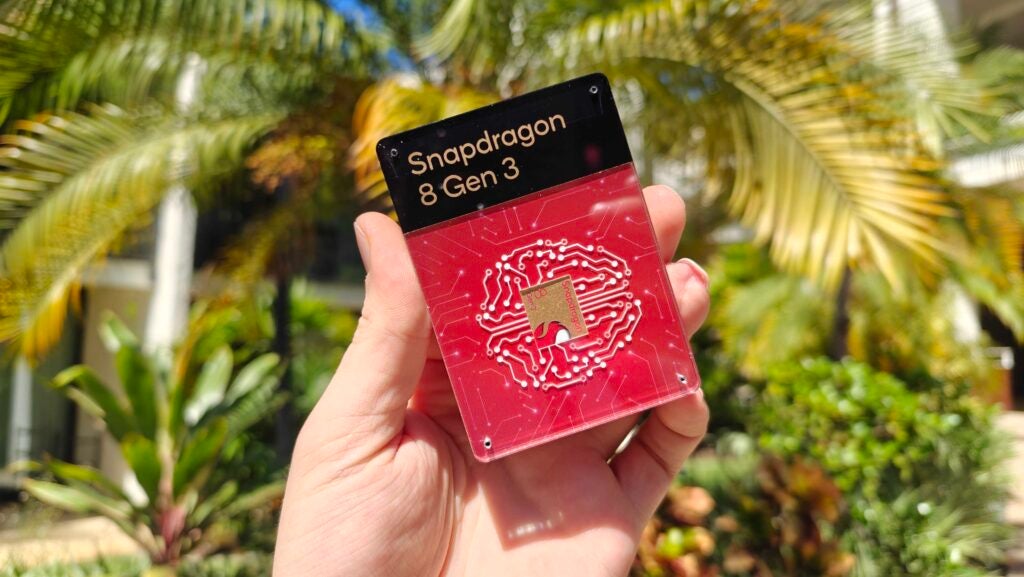MediaTek has announced its new flagship chipset, the Dimensity 9400, but how does it compare to Qualcomm’s popular Snapdragon 8 Gen 3?
While the newer MediaTek processor boasts impressive processing power, the year-old Snapdragon 8 Gen 3 still manages to secure a crucial win in several key areas like gaming, audio and multi-device support.
That being said, here’s how the MediaTek Dimensity 9400 compares to the Snapdragon 8 Gen 3. For more on what’s new from this year’s chipset, take a look at our MediaTek Dimensity 9400 vs Dimensity 9300 comparison.
When it comes to raw processing power, the MediaTek Dimensity 9400 is the clear winner here – though it does have a massive advantage, having just been announced while the Snapdragon 8 Gen 3 is fast approaching its first birthday.
That said, the new MediaTek Dimensity 9400 sees the return of the ‘All-Big-Core’ design introduced with last year’s flagship Dimensity chipset, with the company throwing around some big numbers when it comes to year-on-year performance.
Headline spec boosts include a 35% boost to CPU single-core power and 28% on the multi-core front, while the GPU is 41% more powerful while managing to be 44% more efficient.
There’s also an upgraded NPU that powers the onboard AI experience, with MediaTek claiming that it’s 2x faster at generating images, while there’s a 70% uptick when LLMs are handling prompts.
This all makes for some impressive performance, with the Dimensity 9400 scoring 3055 and 9600 in Geekbench 6’s single- and multi-core tests. For context, the most powerful Snapdragon 8 Gen 3-equipped phone, the RedMagic 9S Pro, offered results of 2277 and 7097 respectively in the same tests.
That said, the Snapdragon 8 Gen 3 is no slouch in real-world use; there’s a reason why it’s in most 2024 flagship smartphones, from the Samsung Galaxy S24 Ultra to the OnePlus 12 and Honor Magic 6 Pro. It’s more than capable of delivering a high-end everyday experience with solid gameplay capabilities – it’s just not quite as rapid in synthetic benchmark testing.


Both offer a great gaming experience
Regardless of whether you opt for the Dimensity or Snapdragon chipset, you’ll get a great mobile gaming experience. That’s not only down to the sheer power of the flagship chipsets either; both also offer a suite of gaming-focused features that look to emulate the PC/console gaming experience as closely as possible.
For the Qualcomm chipset, that all falls under the Snapdragon Elite Gaming umbrella. The highlights of the tech include support for hardware-accelerated ray-tracing with global illumination, along with support for 240Hz displays and, as such, up to 240fps gameplay – though finding a mobile game that hits those heights is a rarity.
MediaTek also has a gaming-focused suite of tools under the MediaTek HyperEngine umbrella, with the most notable including HyperEngine’s Super Resolution which essentially uses AI to upscale lower-resolution games for better power efficiency, as well as the MediaTek Frame Rate Converter for smoother gameplay and support for ‘PC-grade’ raytracing capabilities.
The Snapdragon 8 Gen 3 has better ecosystem support
While MediaTek might have the upper hand in the processing department, Qualcomm has an advantage when it comes to ecosystem features – that’s one of the benefits of being a key player in the smartphone, laptop, tablet and wearable space.
More specifically, the Snapdragon 8 Gen 3 offers support for Snapdragon Seamless, a new ecosystem that allows Snapdragon-equipped devices like smartphones to work with other devices like laptops, allowing for features like dragging and dropping content between devices wirelessly. It also has support for XR devices, but it’s still very early days in that respect.
It also enables smaller features, like the ability to allow earbuds to automatically switch between devices depending on which you’re using, as well as the ability to intelligently share your phone’s internet connection with other devices.


Both the Snapdragon 8 Gen 3 and Dimensity 9400 have a focus on on-device AI, with support for a range of AI-powered features depending on what manufacturers decide to include with their devices.
This allows smartphones to perform actions like generating images entirely on-device, as well as support LLMs for faster query responses and even on-device translation capabilities.
However, MediaTek is looking to differentiate its approach to on-device GenAI on the Dimensity 9400 with support for what it calls Agentic AI. It essentially provides a framework for manufacturers and developers to create AI-powered Agents that can handle specific processes on-device.
MediaTek has been pretty coy on specific examples of what this could offer, but claims that multiple partners are making use of it with 9400-equipped devices due out in the coming months.
The Snapdragon 8 Gen 3 boasts better audio capabilities
Qualcomm uses the fact that Snapdragon chips are commonly used in earbuds and headphones to its advantage. All packaged under the Snapdragon Sound moniker, the chipset essentially allows for an impressive audio experience.
That includes features like Expanded Personal Area Network (XPAN_ technology, the first widely used solution that uses Wi-Fi to deliver lossless audio, even when moving from room to room. It also delivers low-latency audio for gaming at just 48ms, along with spatial audio, the aforementioned ability to intelligently switch between devices, along with improved voice quality in calls and AI-powered background noise reduction.
MediaTek’s Dimensity 9400 does make some strides in the audio department with support for up to 24-bit/384KHz Bluetooth audio, along with 24-bit audio recording via up to 6 mics depending on the smartphone hardware in question, but it’s not quite as fully featured as the Snapdragon alternative.




